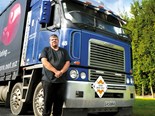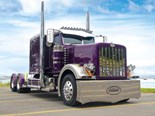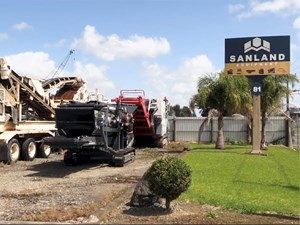The TranzNorth approach to safer trucking
With 22 drivers each spending many hours per day behind the wheel, safety is paramount for Northland chilled transport company TranzNorth.
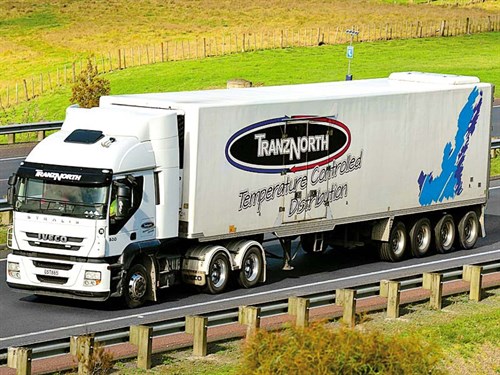
Road safety is one of the biggest workplace issues for trucking companies. With new health and safety rules being brought in this year, there’s an even greater need for employers ensure they have every possible safety measure in place.
In recent years truck-related road accidents have had more than their fair share of tragic headlines. Lately, it seems there is a serious truck accident occurring on an almost daily basis.
The most recent Ministry of Transport report shows that in 2014, 67 people died and a further 772 were injured in road crashes involving trucks.
Sadly, the sheer mass and size of most trucks means that accidents involving trucks are usually serious.
But there are a number of tools truck companies can now take to help improve the safety of their trucks on the road.
One of those is the Operator Rating System (ORS). The ORS encourages truck and transport companies to make their vehicles and driving practices as safe as possible, and to comply with regulatory obligations that contribute to safety.
The ORS rates truck and transport operators against New Zealand transport standards and regulations. Scores range from between one and five stars, five being the best. The rating is based on a number of factors including the results of CoF inspections, roadside inspections, and traffic offences and infringements.
TranzNorth chief operating officer Derek Slatter explains the company has firm views about transparency around safety ratings. "Things like electronic log books and the Operator Safety Rating system should be public in our view," he says.
"Undoubtedly there are operators out there who don’t want their safety records being accessible for obvious reasons, but they should be."
Slatter says that some industries, such as forestry and logging, are under a huge amount of pressure to meet targets.
"Until that pressure is taken off the driver, you’re not going to see any change. But one positive step would be to make ORS results readily available.
"If you can see that one particular forestry company is always using one or two-star rated operators that are regularly involved in incidents, then responsibility for that should lie with the forestry company."
Established in 1996, TranzNorth holds a five-star ORS rating. The company provides temperature-controlled transport services between Auckland and Kaitaia. Its modern fleet of Euro5 trucks use state-of-the-art fibreglass bodies and refrigeration systems.
Slatter explains that the staff and management put a lot of work into raising their rating from four-stars just a few years ago.
"TranzNorth made the decision to embrace compliance to improve business outcomes for all stakeholders," he says.
"We had a lot of frustrations along the way. For example a CVIU inspection showed up a loose body bolt which is a deduction of nine points on your ORS. That seems like a huge blow for one loose body bolt. But if you think about it, you soon realise that a loose body bolt can result in a loose body. And if you have a body fall off a truck it would be a pretty serious matter.
"The end result is that we now pay serious attention to body bolts. And the truth is, it’s not hard to notice that they’re loose. It’s not an expensive thing to check and make sure it doesn’t happen."
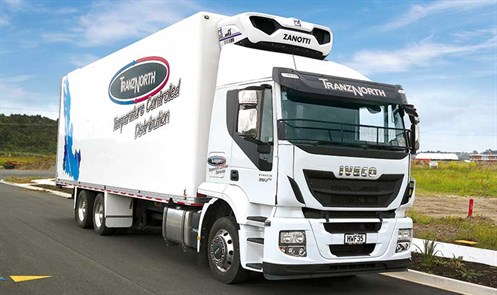
TranzNorth also uses ERoad which provides GPS tracking of each truck including speed, braking and acceleration, and location. "We also run our electronic log books through ERoad which has been instrumental in getting our drivers on board with the message around slowing down and driving safely," says Slatter.
"The beauty of the GPS is that you’ve got cold hard, black and white data which is undisputable. It makes having those conversations with drivers a lot easier because it takes away any doubt. There are no opinions or assumptions, just facts.
"We can instantly see if we have drivers who are speeding, where they’re speeding, for how long and how often. We can then do something about it."
The ERoad system includes a leaderboard which ranks drivers on the frequency and severity of speeding events, the total distance driven, and the frequency of harsh braking and sharp acceleration events. These factors combine to give each vehicle or driver a rating which is compared against other ERoad users.
"When the new health and safety rules came into force earlier this year, we had all of our drivers identify the potential hazards they may face in their work day. Interestingly, the drivers didn’t think speeding was a hazard. But when you look at the data you see a different story.
"We realised that with this data, we could set targets and provide the drivers incentives for improvement.
"Over the past few months we set a target from raising our leaderboard rating from under 3.5 stars to 4.2. Last week we achieved 4.33 which is fantastic. But what’s really important is that we haven’t had any accidents or any speeding tickets, and that influences our ORS. And as an added bonus, we’ve saved around $3000 in fuel.
"Looking at the ERoad report from the past two years, we can see we have around 930 fewer speeding events per unit which has led to an increase of .23km/L in fuel efficiency and a saving of .04c/km.
"That’s pretty significant. And those sorts of stats make it easy to show the drivers that speeding is also costly. For example we had one driver who was very conscientious about getting back in time so the next shift wouldn’t be waiting around. As a result he was regularly driving too fast. We worked out that his speeding was only saving him around one minute and 37 seconds, but costing an extra $16 in fuel. It just wasn’t worth it. When the guys see those sorts of facts and figures, they understand it and instantly change their behaviour."
Slatter says he’s noticed a big change in the guys who were speeding the most. "Now they’re more relaxed. They now realise that as a company, we’re more concerned about safety targets than time targets. Taking that option of driving faster out of their daily drive actually takes a lot of the stress out of their day.
"And I’m sure the average New Zealand driver would appreciate knowing they’re sharing the road with drivers who have safety, not speed, in the forefront of their minds."
Keep up to date in the industry by signing up to Deals on Wheels' free newsletter or liking us on Facebook.


.jpg)




.jpg)




